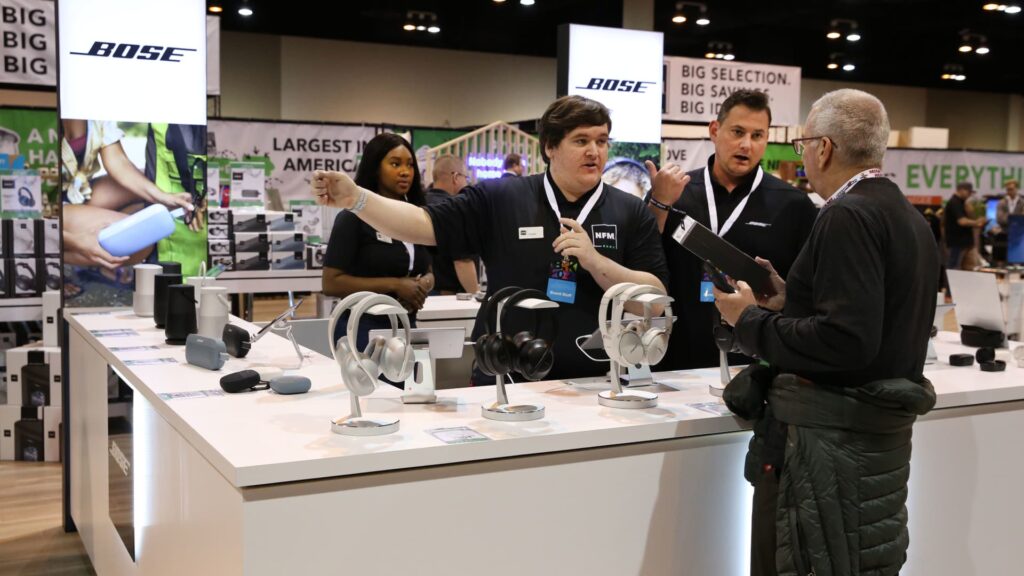The BOSE display at the Berkshire Hathaway Annual Shareholders Meeting in Omaha, Nebraska.
David A. Grogan | CNBC
Bose Corp. will purchase the McIntosh Group, a deal that will give the Massachusetts-based company control of one of the most storied names in high-end audio.
McIntosh will continue to manufacture the high-end audio equipment it is known for out of its longtime headquarters in Binghamton, New York, Bose CEO Lila Snyder said. The deal also includes Sonus Faber, a company that makes high-end speakers by hand in Italy.
The purchase of the two audio workshops provides Bose access into the high-end luxury audio market, Snyder told CNBC in an interview.
“There is this opportunity for luxury, where the consumer is more discerning, really interested in the heritage and the story, and that handcrafted nature,” she said.
Snyder, who took over as Bose CEO in 2020, did not provide terms or a price for the deal. McIntosh was previously owned by Highlander Partners, a Dallas-based private equity firm.
McIntosh has been making high-end amplifiers and other audio equipment since 1949, and one of its devices can cost tens of thousands of dollars. Sonus Faber sells a pair of speakers that costs $140,000.
The purchase shows how Bose is navigating an environment where there is more competition in headphones and audio electronics than ever. Bose is privately held and doesn’t share annual revenue, although it had about $3 billion in sales in 2023, according to Forbes. It has about 3,000 employees.
Bose enters the high-end luxury audio market
Luxury audio — defined as products that cost more than $5,000 — grew 12% in 2023 to about $2.8 billion in total sales, according to an estimate from Futuresource Consulting. The deal will allow Bose to test a higher-end market for its products, which are already expensive – a pair of Bose headphones can easily cost $350.
“These are different customers that right now we’re not really reaching with our technology and with our products,” she said.
Snyder did not rule out the possibility of Bose producing McIntosh-branded headphones or other products.
“We do think there’s a real opportunity around wearables in the luxury and high-performance space as well, which is something that we would expect you to see from us down the road,” Synder said.
Bose is best-known for its speakers and its headphones, including the QuietComfort headphones line, which was one of the first noise-canceling headsets to hit the market in 2000. It also sells soundbars, wireless earbuds, speakers and audio equipment for cars. It divested a group that built sound systems for auditoriums and other professional environments last year.
The audio market has grown since Bose was one of the few high-end brands.
Bose now competes against some of the biggest companies in the world, including Apple, which bought Beats Electronics for $3 billion in 2014 and released the AirPods in 2016, targeting the premium headphone market.
There is also new audio-focused competition for Bose.
Sonos, which was best known for its in-home speakers, introduced its first noise-canceling headphones earlier this year, although the company is reeling from an app redesign in May that was received poorly by users. Bose also spent the past decade competing with smart speakers from the likes of Amazon and Google that were often priced aggressively low to spur adoption.
The purchase of the two luxury audio workshops could help Bose grow in the in-car stereo market, which Snyder said makes up about a third of the company’s overall business. Sonus Faber produces speakers for Lamborghini cars, for example, and some Jeeps have a McIntosh-branded audio system. One possibility that Bose is excited about is that it can integrate its noise-canceling technology in electric cars to make the vehicle ride quieter, she said.
“There are places today where the Bose brand probably can’t go. Lamborghini is a great example of that,” Snyder said. “You really want the very best kind of cutting-edge technology to be in those luxury or highest-performing vehicles.”
WATCH: Why the hearing aid industry is poised to grow


